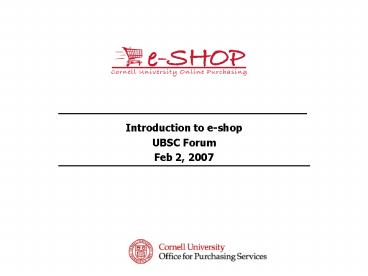Introduction to eshop - PowerPoint PPT Presentation
1 / 10
Title:
Introduction to eshop
Description:
User access: Both P-card and non P-card users can use e-shop. BSC/Department decides who is 'in' ... non catalog supplier. Demonstration. Set-up #2. The user ... – PowerPoint PPT presentation
Number of Views:49
Avg rating:3.0/5.0
Title: Introduction to eshop
1
- Introduction to e-shop
- UBSC Forum
- Feb 2, 2007
2
Agenda
- Introduction
- E-shop/SciQuest background
- Results to date
- Timeline
- Workflow Demonstration
- Questions
3
Introduction
- Purchasing e-shop team
- Amita Verma Implementation Lead
- Dennis Butts Systems Lead
- Mike Winters Supplier Set up lead
- Melinda Sweazey Administrative Lead
- Michelle Lane Administrative support
4
E-shop/Sciquest background
E-procurement is a well recognized supply
management best practice worldwide
- E-procurement has been proven to
- Consolidate spending into fewer suppliers with
negotiated contracts - Provide a convenient self service tool to todays
web-savvy buyers - Move purchasing from order management to
strategic partnership with the organization to
generate long term cost savings - Best practices at major implementation sites show
5-20 savings in spend dollars - SciQuest is an e-Procurement module targeted for
institutions of higher learning. - Deployed successfully at over 50 universities
including Penn, Yale, Notre Dame and the
University of Arizona. - The Cornell SciQuest program is branded e-SHOP.
5
Benchmarks
Top research and teaching schools such as Yale,
MIT, Penn State, U Penn have fully adopted
e-procurement and are advocating its adoption
based on ROI and user feedback.
- Yale
- After successful roll out in 2006, they have, as
of Jan 2007, removed the option of using the old
Purchasing system. SciQuest is the only way to
buy.
- University of Pennsylvania
- Over 20million in purchases accounting for 68
of the purchases, 13 of total dollars through
e-procurement.
Penn State Over 13 million in purchases in 13
months with only 12 suppliers. University wide
adoption
http//www.ebuy.psu.edu
http//www.purchasing.upenn.edu
http//www.yale.edu/procurement/eprocurement/
Over 100 higher education institutions are either
already in e-procurement or are actively looking
to implement it in their organizations.
6
Why e-shop at Cornell?
- Opportunity to further reduce the large supplier
base, given several existing negotiated contracts - Over 6,000 active suppliers in APPS, 50 with 1
annual transaction - Over 80 contracted suppliers, with documented
savings of 10-20 vs. non-contract suppliers.
However, a significant amount of eligible spend
happens elsewhere. - Several one off contracts vs. negotiated
University wide contracts - Users may not know of contract suppliers since
they are not identified in APPS. - Users are looking for quicker, easier ways to
process purchases - Effectively balance empowerment with compliance
to policy - Existing resources could be better utilized
- P-card
- BSC structure
- Need a work around to APPS. APPS limits
flexibility, reporting, analysis process
improvements
Example Scientific Supplies FY 2006 spend
11.6MM Number of Suppliers 1,250 Suppliers
with lt1,000 spend 470 Spend with Contract
suppliers (VWR Fisher Scientific) 2.1MM
Known savings compared to non-preferred
suppliers 20 or 500K Estimated savings at 50
consolidation of spend, 1MM
7
Results to date
The pilot e-shop program is performing well, and
we are well positioned for wider deployment.
- History
- In April 2006 we assembled a cross-functional
team from CALS, Campus Life, Chemistry, UBSC and
the Vet School to review the delivered SciQuest
product - We went live on October 23 with a group of
pilot users from the 5 BSCs and a group of
departments. - Performance
- The pilot users have issued 761 purchase orders
for 328K. 86 of the spend is with Catalog
suppliers - 98 suppliers 15 with punch-out catalogs, 10
with hosted catalogs and the rest non-catalog
type. - No major system or procedural setbacks. Some
minor fixes to scale up for a larger roll out - Customer Experience
- User feedback has been largely positive, however
common observations include - Not all desired suppliers are enabled, hence
current spend is limited - It takes 2-3 requisitions to be completely
comfortable with the system - Internal procedures vary by department making it
difficult to standardize processes
8
E-shop timeline
We have a cautiously aggressive deployment plan
for e-shop for Cornell
Oct, 06
Feb, 07
Mar, 07
April, 06
Wave I, Phase 1 Pilot BSCs
Wave I, Phase 2 Pilot BSCs all users
Wave II, Phase 1 PDC, LEPP, CHE
Set-up Test
Key roll out decision Wave implementation OR
Campus wide, open registration
- What is happening now?
- Supplier enablement and selection criteria
- Wave II planning
- Training enhancements
- Decision making process for roll out.
9
e-shop workflow
The e-shop workflow is designed to accomodate
competing needs ease of use, internal controls
and the diverse business practices within
departments.
- Flexibility built in at all levels
- User access Both P-card and non P-card users can
use e-shop. BSC/Department decides who is in - Payment options P-card or not
- Approval levels Three primary levels of
approval, customizable to the needs of the user
groups. - Optional department approval at all spend levels
- BSC 1 and BSC 2 approval for orders greater than
500 but less than 5,000 - Purchasing approval for orders above 5,000
10
Demonstration
- Set-up 1
- The user has a P-card. We will create a
requisition for less than 500 with orders from
three suppliers - Staples ( an online punch out catalog)
- Supplier with hosted catalog
- non catalog supplier
- Set-up 2
- The user does not have a P-card. We will create a
requisition for less than 500 with an orders
from - Staples ( an online punch out catalog)































